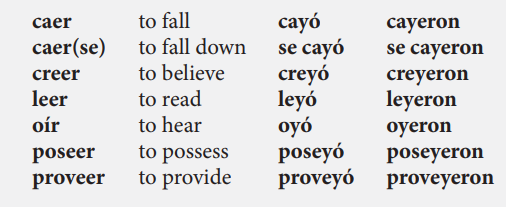Spanish - Preterite and Imperfect Review (Past Tense)
1/30
Earn XP
Description and Tags
Vocabulary flashcards covering the key concepts of the Spanish past tenses: Preterite, Imperfect, irregulars, spelling changes, and the past progressive.
Name | Mastery | Learn | Test | Matching | Spaced |
|---|
No study sessions yet.
31 Terms
Preterite (past tense)
Spanish past tense used for completed actions with a defined beginning/end, specific times, or a sequence of events.
Imperfect (past tense)
Past tense used for ongoing, habitual, or descriptive actions in the past; no defined start/end.
Past Progressive
Formed with estar in the imperfect + the gerund (-ando/-iendo) to describe actions that were in progress in the past.
AR endings (preterite)
yo -é, tú -aste, él/ella/usted -ó, nosotros -amos, vosotros -asteis, ellos/ellas/ustedes -aron.
ER/IR endings (preterite)
yo -í, tú -iste, él/ella/usted -ió, nosotros -imos, vosotros -isteis, ellos/ellas/ustedes -ieron.
GAR spelling changes (yo form)
GAR verbs change to gu before é in the yo form to preserve the hard g sound (e.g., llegar → llegué).
CAR spelling change (yo form)
CAR verbs change to qu before é in the yo form to preserve the hard c sound (e.g., buscar → busqué).
ZAR spelling change (yo form)
ZAR verbs change to ce before é in the yo form (e.g., empezar → empecé).
Tener (preterite)
To have (preterite): tuve, tuviste, tuvo, tuvimos, tuvisteis, tuvieron.
Estar (preterite)
To be (temporary/location) (preterite): estuve, estuviste, estuvo, estuvimos, estuvisteis, estuvieron.
Poder (preterite)
To be able to/cot: pude, pudiste, pudo, pudimos, pudisteis, pudieron.
Poner (preterite)
To put: puse, pusiste, puso, pusimos, pusisteis, pusieron.
Saber (preterite)
To know: supe, supiste, supo, supimos, supisteis, supieron.
Hacer (preterite)
To do/make: hice, hiciste, hizo, hicimos, hicisteis, hicieron.
Querer (preterite)
To want: quise, quisiste, quiso, quisimos, quisisteis, quisieron.
Venir (preterite)
To come: vine, viniste, vino, vinimos, vinisteis, vinieron.
Dar (preterite)
To give: di, diste, dio, dimos, disteis, dieron.
Ver (preterite)
To see: vi, viste, vio, vimos, visteis, vieron.
Ser/Ir (preterite)
In the preterite, ser and ir share the same forms: fui, fuiste, fue, fuimos, fuisteis, fueron.
Decir (preterite)
To say/tell: dije, dijiste, dijo, dijimos, dijisteis, dijeron.
Traer (preterite)
To bring: traje, trajiste, trajo, trajimos, trajisteis, trajeron.
Imperfect endings (AR verbs)
yo -aba, tú -abas, él/ella/usted -aba, nosotros -ábamos, vosotros -abais, ellos/ellas/ustedes -aban.
Imperfect endings (ER/IR verbs)
yo -ía, tú -ías, él/ella/usted -ía, nosotros -íamos, vosotros -íais, ellos/ellas/ustedes -ían.
Imperfect usage
Used to describe habitual actions, ongoing/background descriptions, time, age, etc., in the past.
Imperfect irregulars (ser/ir/ver)
Imperfect forms: ser → era/eras/era/éramos/erais/eran; ir → iba/ibas/iba/íbamos/ibais/iban; ver → veía/veías/veía/veíamos/veíais/veían.
Imperfect progressive example
Form with imperfect estar + -ando/-iendo: e.g., estaba hablando (I was speaking), estábamos escribiendo (we were writing).
Ser vs Ir in preterite
In the preterite, ser and ir have identical forms but different meanings (both use fui, fuiste, fue, fuimos, fuisteis, fueron).
Present participle (gerund)
-ando (AR) or -iendo/-yendo (ER/IR); used with estar to form the past progressive and as the present participle.
For those -er and -ir verbs with a vowel immediately preceding the infi nitive ending, the verb ending for the preterite forms follows this pattern: Th e third-person singular verb ending changes from -ío to -yó, and the third-person plural verb ending changes from -ieron to -yeron, and in all other conjugated forms in the preterite (instead of only the fi rst-person singular form), the i becomes í (with a written accent).

i > y change in the preterite
All verbs ending with -ucir are conjugated like producir, where the c changes to j, and the endings are -e, -iste, -o, -imos, -isteis, -eron.
